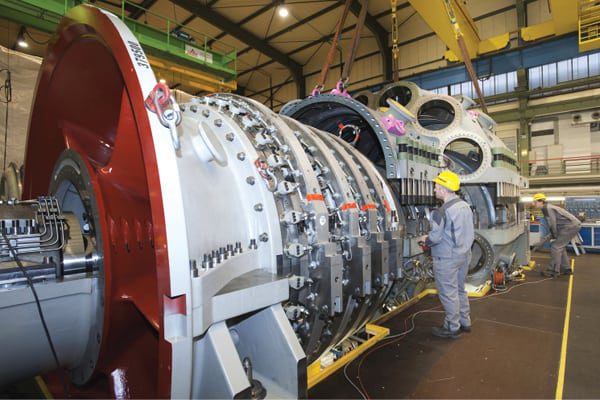E.ON Avoids Shuttering Ultramodern German Combined Cycle Units Despite Profit Concerns
German energy giant E.ON in late April narrowly averted idling its Irsching 4 and 5 units in Bavaria, Germany—its most technologically advanced gas-fired generating units that began operations just three years ago at a cost of €400 million. The 569-MW Irsching 4 (a 2011 POWER Top Plant) was the world’s first to feature a Siemens H-class turbine (Figure 6) and boasts an efficiency of 60.4%. The 860-MW Irsching 5, commissioned in 2010, has an efficiency of 59.7% and is a multi-shaft plant with two steam turbines, each one with a waste heat recovery boiler.
 |
| 6. The 60-Hz H-Class. E.ON’s Irsching 4 unit in Bavaria was the test site of Siemens’ advanced 50-Hz “H-class” SGT5-8000H gas turbine until the end of 2009, when it was expanded into a combined cycle gas turbine plant by adding a waste heat recovery boiler and a steam turbine. The first of three 60-Hz versions (SGT6-8000H, shown here) of the gas turbine was successfully started at Florida Power & Light Co.’s $900 million Cape Canaveral Next Generation Clean Energy Center in Port St. John, Fla., last November. Cape Canaveral began commercial operations on April 24. The 274-MW turbine is also capable of reaching efficiencies topping 60% in combined cycle operation, Siemens says. Courtesy: Siemens Energy |
But E.ON had said the highly efficient combined cycle units were unprofitable because, while Europe’s wholesale power prices had fallen by 50% since 2009, low-cost coal imports and low carbon trading prices had squeezed profit margins of power plants burning much pricier natural gas to near zero. An agreement reached between E.ON, Germany’s Federal Network Agency, and the local network operator Tennet TSO this April ensures, however, that E.ON will receive “acceptable compensation” for its fixed costs of the two units. Tennet said the units were needed to enable support of tremendous renewables growth in the country and for redispatch measures, if necessary.
Germany’s Federal Network Agency recently ordered that fixed costs should be paid to power plants that are operated more than 10% of the time on demand of transmission operators. A paradigm market design in Germany was still necessary, as E.ON CEO Johannes Teyssen said in a statement, particularly one that provides acceptable compensation for maintaining technologically advanced, climate-friendly generating capacity. Germany is still “too fixated on megawatts,” installing wind turbine after wind turbine and solar panel after solar panel “in the belief that by doing so it has already transformed its energy system,” he added.
The traditional distinction between generation, transmission, distribution, and consumption is “dissolving,” Teyssen said, pointing to the evolution of smart grids. The focal point of these grids isn’t the traditional energy utility but rather the customer. “Customers can now choose whether they want to buy energy from the grid or make it themselves and perhaps even market it to others.” E.ON is part of that transformation, he said, and that will create a greater earnings strength and lasting value for its shareholders.
—Sonal Patel is POWER’s senior writer.